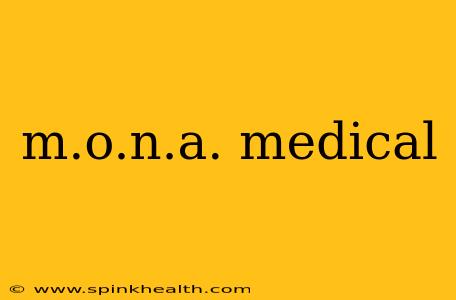M.O.N.A. Medical: Understanding the Acronym and Its Significance in Emergency Care
The acronym M.O.N.A. is a cornerstone of emergency medical treatment, especially for a specific, life-threatening condition. But what does it stand for, and why is it so crucial? Let's dive into the story behind M.O.N.A. and its vital role in saving lives.
Imagine this: you're a paramedic rushing to a scene where a patient is experiencing chest pain, shortness of breath, and profuse sweating. The clock is ticking. Every second counts. In this high-pressure situation, remembering M.O.N.A. could be the difference between life and death. This mnemonic device provides a quick, efficient guide for initial treatment, buying valuable time until more advanced medical care arrives.
What does M.O.N.A. stand for?
M.O.N.A. stands for:
- M: Morphine (for pain relief)
- O: Oxygen (to improve oxygenation)
- N: Nitroglycerin (to dilate blood vessels)
- A: Aspirin (to prevent blood clotting)
This isn't a catch-all solution for every heart-related emergency. It's specifically tailored to a condition known as acute coronary syndrome (ACS), which encompasses various heart problems including heart attacks. Understanding the context of its use is crucial.
Why is M.O.N.A. important in treating acute coronary syndrome?
Each component of M.O.N.A. plays a vital role in addressing different aspects of ACS:
- Morphine: Helps alleviate chest pain, reducing the patient's anxiety and discomfort, which are significant stressors on the cardiovascular system. It also has mild vasodilating properties.
- Oxygen: Improves the oxygen supply to the heart muscle, combating hypoxia (lack of oxygen) which can exacerbate heart damage. Supplementing oxygen is a cornerstone of emergency cardiac care.
- Nitroglycerin: A potent vasodilator, nitroglycerin widens blood vessels, improving blood flow to the heart and reducing the workload on the heart muscle. This helps relieve chest pain and improves overall cardiac function.
- Aspirin: An antiplatelet agent, aspirin helps prevent blood clots from forming. Blood clots are a primary cause of heart attacks, so preventing their formation is essential in mitigating further damage.
Are there any contraindications for using M.O.N.A.?
While M.O.N.A. is a valuable tool, it’s not a one-size-fits-all solution. There are certain situations where one or more of these medications might be contraindicated:
- Morphine: May be contraindicated in patients with certain respiratory conditions or those with a history of morphine allergy.
- Oxygen: While generally safe, high concentrations of oxygen can be harmful in specific circumstances.
- Nitroglycerin: Should be avoided in patients with low blood pressure or those taking certain medications.
- Aspirin: Contraindicated in patients with known allergies or bleeding disorders.
Therefore, the administration of M.O.N.A. should always be done by trained medical professionals who can assess the patient's individual condition and determine the appropriateness of each medication.
What other treatments are used for acute coronary syndrome besides M.O.N.A.?
M.O.N.A. represents the initial steps in treating acute coronary syndrome. Subsequent treatments may include:
- Cardiac catheterization: A procedure to open blocked arteries.
- Thrombolytic therapy: Using clot-busting medications.
- Coronary artery bypass grafting (CABG): Surgical procedure to bypass blocked arteries.
Is M.O.N.A. the only treatment protocol for chest pain?
No, M.O.N.A. is specifically focused on acute coronary syndrome, a subset of chest pain. Other causes of chest pain require different treatments. A thorough assessment by a medical professional is crucial to determine the underlying cause and appropriate management.
M.O.N.A. is a powerful mnemonic device used by emergency medical professionals. However, it’s essential to remember that it’s a guideline for initial treatment, not a replacement for a comprehensive medical evaluation and treatment plan. Always seek immediate medical attention if you suspect you or someone you know is experiencing symptoms of a heart attack. This information is for educational purposes only and does not constitute medical advice.

